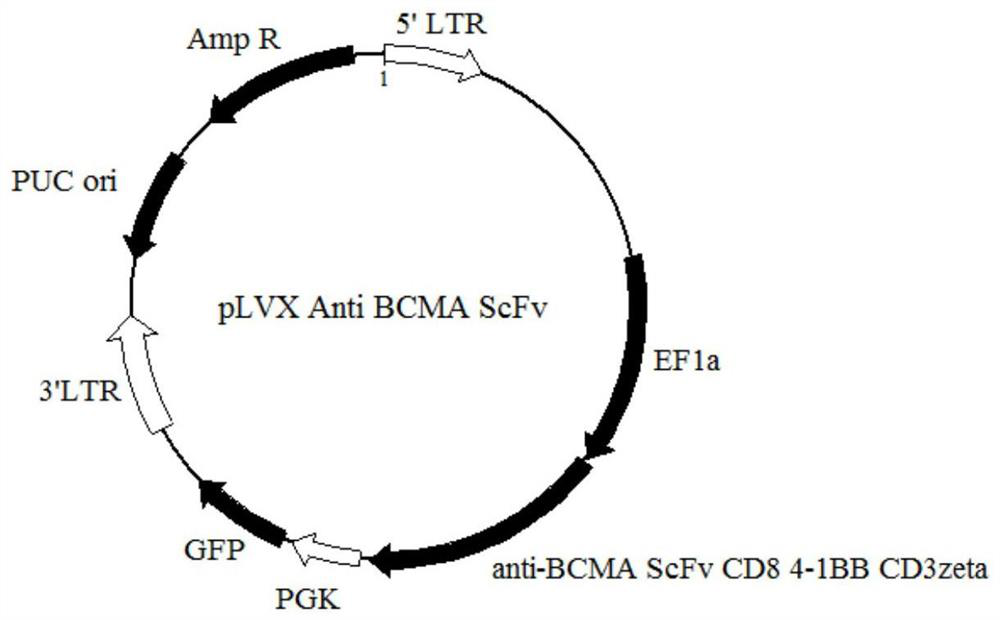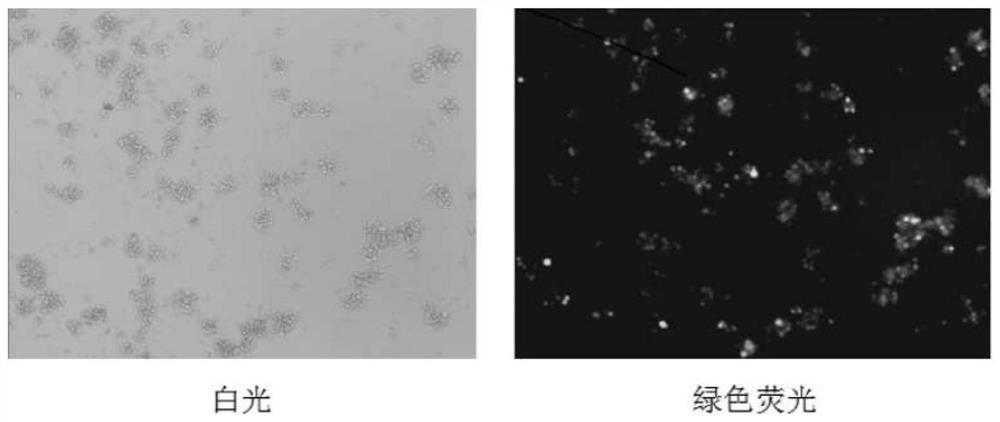BCMA-specific chimeric antigen receptor T cells and their applications
A chimeric antigen receptor and cell technology, applied in the direction of anti-receptor/cell surface antigen/cell surface determinant immunoglobulin, application, hybrid peptide, etc., can solve the problem of limited number of cases, tissue and organ damage, CAR- Misidentification of T, attacking normal cells, etc.
- Summary
- Abstract
- Description
- Claims
- Application Information
AI Technical Summary
Problems solved by technology
Method used
Image
Examples
Embodiment 1
[0061] Example 1: Determination of anti-BCMA-CD8a-41BB-CD3ζ gene sequence
[0062] The gene sequence of the anti-human BCMA single-chain antibody is derived from the hybridoma cells of BCMA-immunized mice. The gene sequence information of human CD8α signal peptide region, hinge region and transmembrane region, human 4-1BB intracellular region and human CD3ζ intracellular region was searched from the NCBI website database. The above sequence was codon-optimized on the website http: / / www.jcat.de / to ensure that it is more suitable for human gene expression under the condition that the encoded amino acid sequence remains unchanged. A Kozak sequence and restriction site were introduced at the amino-terminal of the signal peptide gene sequence, and the nucleotide sequences of each segment were sent to Shanghai Sangon Biotechnology Co., Ltd. for synthesis. See SEQUENCE LISTING (SEQ ID NO: 1-22) for the sequence information of each gene. The structure of the successfully constructed...
Embodiment 2
[0063] Example 2: Construction of anti-BCMA-CD8a-41BB-CD3ζ lentiviral vector
[0064] Using overlapping PCR, the above-mentioned synthetic sequences were sequentially linked according to the sequence of signal peptide, anti-BCMAscFv, human CD8α hinge region, human CD8α transmembrane region, human 4-1BB intracellular region, and human CD3ζ intracellular region to form a complete anti- BCMA-CAR gene sequence information to obtain the CAR molecule (hereinafter referred to as "anti-BCMA-CAR"). The nucleotide sequence of anti-BCMA-CAR is shown in SEQ ID NO: 21 or SEQ ID NO: 22, and the encoded amino acid sequence is shown in SEQ ID NO: 19 or SEQ ID NO: 20.
[0065] The nucleotide sequence of anti-BCMA-CAR was double-digested with EcoR I and BamH I, and then inserted into the modified lentiviral vector pLVX-EF1a-GFP-N1 (Addgene) by T4 DNA ligase with EcoR I and BamH I. site, transformed into competent DH5α Escherichia coli. The obtained recombinant plasmid was sent to Shanghai San...
Embodiment 3
[0066] Example 3: Packaging and titer determination of anti-BCMA-CAR lentivirus
[0067] Extract the lentiviral packaging vectors pMD2.G, psPAX2 and anti-BCMA-CAR lentiviral vectors with the operating instructions in the endotoxin-free plasmid extraction kit (Tiangen Bio) and co-transfect them into 293T cells. After transfection, 48h and The cell supernatant was collected at 72 hours, centrifuged at 400 rcf for 10 minutes, and the cells and cell debris in the supernatant were removed. Filter the supernatant with a 0.45 μm filter membrane, aliquot and freeze for future use.
[0068] According to the expected virus titer (MOI), the virus supernatant was serially diluted and then infected 293T cells. The positive rate of GFP was detected by fluorescence microscope. According to the formula, the titers of pLVX-CAR and pLVX-empty virus stocks were calculated to be about 2 respectively. ×10 6 TU / mL and 5×10 6 TU / mL. After the concentrated solution is concentrated, the titer can ...
PUM
 Login to View More
Login to View More Abstract
Description
Claims
Application Information
 Login to View More
Login to View More - R&D
- Intellectual Property
- Life Sciences
- Materials
- Tech Scout
- Unparalleled Data Quality
- Higher Quality Content
- 60% Fewer Hallucinations
Browse by: Latest US Patents, China's latest patents, Technical Efficacy Thesaurus, Application Domain, Technology Topic, Popular Technical Reports.
© 2025 PatSnap. All rights reserved.Legal|Privacy policy|Modern Slavery Act Transparency Statement|Sitemap|About US| Contact US: help@patsnap.com



